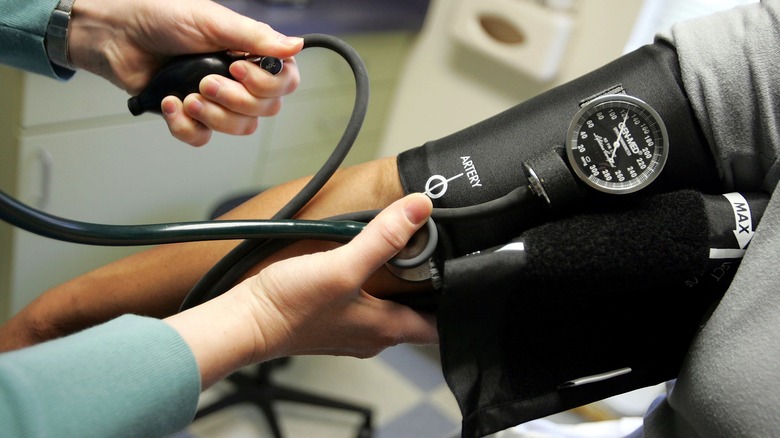Does High Blood Pressure Really Cause Nosebleeds?
Having high blood pressure doesn't only influence our heart health. Otherwise known as hypertension, having high blood pressure can increase our chances of developing other diseases, such as those of the kidney or brain, reports the World Health Organization (WHO).
K Health explains that blood pressure readings allow us to see how much pressure is being placed on our arteries as our heart pumps blood throughout the body. The top number designates our systolic blood pressure while the number underneath indicates our diastolic blood pressure level. Those with a blood pressure reading that regularly exceeds 130/80mmHg are considered to have high blood pressure.
As a major contributor to rates of premature death around the globe, nearly half of all adults with high blood pressure are unknowingly affected by the condition, as it often presents with no clear symptoms (via WHO). Those who do experience symptoms may have morning-time headaches, vision changes, irregular heartbeat, or buzzing sensations in the ears. More severe symptoms include fatigue, confusion, nausea, vomiting, chest pain, and more. Some people may also experience nosebleeds in relation to high blood pressure. However, is high blood pressure really the cause of these nosebleeds, or could there be a different explanation for the link between the two?
High blood pressure may influence nosebleed frequency and severity
Heart health researchers behind a 2022 research paper published in the European Heart Journal set out to determine which factors put kids and adolescents at higher risk for hypertension. When taking stock of symptoms through physical exams and assessments of patient medical history, nosebleeds were one symptom the researchers considered an indication of high blood pressure. While most experts agree that nosebleeds may be a symptom of high blood pressure, hypertension is generally not considered to be the direct cause (per WebMD).
However, this doesn't mean that there isn't a potential relationship between the two. Findings from a 2015 study published in the Journal of the Saudi Heart Foundation found that the frequency of nosebleeds increased in patients with a medical history of high blood pressure. In addition, those with high blood pressure also tended to experience more severe nosebleeds, such as those requiring cauterizing or a balloon catheter to stop the bleeding.
WebMD explains that nosebleeds are more likely to occur when blood pressure levels exceed 180/120. Readings this high are considered a hypertensive crisis and require immediate medical attention if blood pressure levels do not decrease after five minutes of rest.


